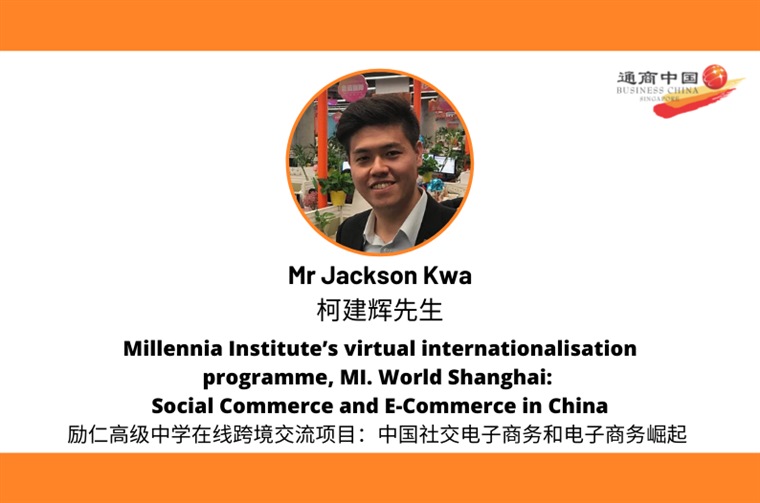Mr Jackson Kwa, a member of the Business China Youth Chapter as well as the recipient of 2018 Singapore Valley Award, shared his take on the rise of social commerce and e-commerce in China during Millennia Institute’s virtual internationalisation programme, MI. World Shanghai on 2 June 2021.
Jackson is the co-founder of TechSociety Group, a technology training company. Drawing from his day-to-day observation at work as well as internship experience at Alibaba Group in China, Jackson shared his examination of the various marketing tactics, user interface designs, user behaviour and user acquisition strategies on Chinese social commerce and e-commerce platforms. He highlighted that speed and hunger for success are the two important traits needed to compete in this industry.
The e-commerce industry is highly competitive. Whether is it a blooming start-up or a high capital well-established company in China, speed remains the competitive edge. Jackson shared that the company that can do things fast and ride on the trend will win. This is because consumers and those on social media have a short attention span, and time waits for no men.
Jackson also said that Chinese are clear with their goals and take concrete steps to fulfil their dream; put simply, the Chinese are hungry for success. He recalled an ex-colleague at Alibaba who joined the company so that he could learn skills to set up a boutique shop.
Consumers power China’s e-commerce industry and drives digitalisation progress
Jackson said that consumers play a central role in China’s development into an e-commerce powerhouse. He observed that it was during the e-commerce age when the internet started gaining popularity across the mass Chinese population. Whereas for those in the rest of the world, Singaporean, for instance, started off using search engines. In addition, the various innovations in e-commerce such as the 11.11 Singles’ Day Sale cultivates consumption habits and hence boost sales.
As to how China progress into a highly digitalised nation, Jackson said that unlike the situation in Singapore, the Chinese government does not have to hand out incentives to drive digitalisation. Instead, it is very much user driven. E-commerce and e-payment companies provide the platforms, and users naturally find them useful and convenient. Hence, they start using them and share among their peers. In summary, digitalisation in China is a ground up effort.
About Jackson Kwa and Young Bilingual Professionals series
Jackson is trained in data analytics, data languages, blockchain technology, AI learning, e-commerce, digital media etc. He went to Hangzhou for exchange at Alibaba HQ and experienced the way of life in China.
Jackson was featured in the 2019 Young Bilingual Professionals series, which is a collaboration between the Promote Mandarin Council and Business China. The series featured eight young bilingual professionals from various sectors and industries.
Business China hopes to reach out to more young professionals from various industries to share their bilingual, bicultural and China experiences with fellow young Singaporeans, thereby raising young Singaporeans’ awareness, interest and knowledge in these areas.
Find out more here about their Mandarin journey stories and how Mandarin has helped them in their professional careers or enriched their personal lives: https://bit.ly/3irdcOi

